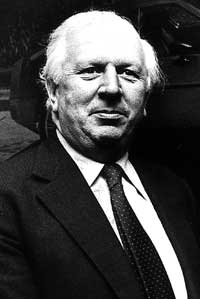21 September 2006 Edition
Remembering 1981:Prior replaces Atkins as Hunger Strike continues

james prior
New Direct Ruler - no change in policy
BY
ELLA O'DWYER
On Tuesday, 15 September 1981, James Prior arrived in Belfast in his role as British direct ruler in the North. There was some speculation at the time that his appointment might lead to new policies. Such speculation was based on Prior's reputation as a political heavyweight and a 'wet' in the British cabinet, his resistance whilst Employment Secretary to legislation aimed at curbing the powers of trade unions, and consistent press reports over a period of weeks that he would resign before replacing Atkins in Stormont. The fact that he didn't resign was taken as the most explicit confirmation that he had successfully bargained for 'considerable autonomy' on the North, though he would make no comment on this when asked.
However, after personally handling the H-Block hunger strike crisis, it was unlikely that Thatcher would so easily surrender such control or allow a settlement that would directly contradict her disastrous mismanagement. Besides, the necessary pressure for breaking the back of British repression was not yet built up because of resistance from the Irish establishment to isolating Britain by real and effective action.
Mounting IRA attacks
Prior's appointment coincided with Gerard Hodgins joining the Hunger Strike. He arrived in the North against a background of mounting IRA attacks on British forces and with the prospect of Britain establishing political normalisation (the third corner of the criminalisation/Ulsterisation triangle) never looking dimmer. Former direct ruler Humphrey Atkins's attempts to set up a non-elected 50-member 'advisory council' died at birth, and the credibility of the SDLP as the political representatives of the nationalist people had taken such a severe knocking as to call into question its future should it face a republican challenge.
Similarly the Dublin coalition Government's future looked bleak. Its wafer-thin majority was threatened by the outcome of a by-election in the Cavan-Monaghan constituency left vacant by the death of Hunger Striker Kieran Doherty TD. The Hunger Strike and the consequent politicisation of tens of thousands of people directly shook the political stability of the 26 Counties.
In the same week that Prior arrived in the North, nationalist councillors walked out of council chambers in Magherafelt and Dungannon over the situation in the H-Blocks, and the Irish Independence Party announced a phased withdrawal from several other council chambers. An appeal from the Hunger Strikers' families for all others to follow was rebuffed by SDLP leaders, who said they would not withdraw. The families said that the council boycott - a peaceful form of protest - would hasten the British in settling the crisis, but the SDLP remained unmoved.
Castro praises Hunger Strike 'heroes'
Despite the inactivity of the SDLP and the political parties in the 26 Counties, international pressure on Britain continued to mount. Leading US politicians attacked Britain, and President Fidel Castro of Cuba, speaking at an international conference in Havana, described the IRA Volunteers as "heroes" who when in prison "should be recognised as political prisoners." The British ambassador to Cuba, David Thomas, walked out in protest. Castro's recognition of the IRA as an army of national liberation raised its status in the eyes of Third World countries and progressive regimes. That the British Government's handling of the H-Block crisis had a disastrous effect on Britain's actual strategy in Ireland started to sink through to everyone except the majority of British politicians. The Liberal Party showed more interest in criticising the Tory government's lack of anti-Hunger Strike propaganda than in ways and means of reaching a settlement. Some sections of the British media, however, concluded that far from defeating the IRA, Thatcher's intransigence was actually strengthening it.
Gerard Hodgins joins Hunger Strike
Gerard Hodgins, aged 21, joined the 1981 Hunger Strike on 13 September. He
was the 22nd man to join the fast. From a West Belfast family of three children, Gerard
was a former cellmate of the late Bobby Sands. His mother lived in the Turf
Lodge area of Belfast and his father had died in 1977.
man to join the fast. From a West Belfast family of three children, Gerard
was a former cellmate of the late Bobby Sands. His mother lived in the Turf
Lodge area of Belfast and his father had died in 1977.
At the time of his father's death, Hodgins was cruelly refused compassionate parole as part of the British Government's policy to increase, at every available opportunity, the mental anguish of the blanketmen, in an attempt to break them.
The Hodgins family originally lived in the Springfield Road area of West Belfast, but after internment in August 1971 they were forced to leave due to loyalist intimidation. The family moved to Downpatrick, County Down where Gerard, then aged 11, grew up in relatively quiet surroundings, regularly going fishing and exploring the countryside.
Hodgins worked as a lorry driver's assistant in nearby Saintfield for six months and later as a labourer in Downpatrick until his arrest in May 1976 when the RUC raided his home. He was then taken to Newtownards barracks where he was held for three days, beaten and threatened. He was charged along with a friend with the attempted killing of several RUC men a week earlier. This charge was later dropped and he was charged with possession of a pistol. Hodgins spent six months on remand and at his non-jury Diplock trial in November 1976 he was sentenced to 14 years' imprisonment. In the H-Blocks he immediately joined his comrades on the blanket protest.
